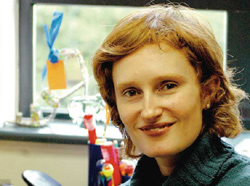Nurses at the helm
11 June 2007
With few doctors around, nurses in many primary-care clinics around the country are left to their own devices.
However capable, the nurses often lack essential skills, especially in the diagnosis of ailments. That's a gap that Dr Lara Fairall, who receives a PhD in medicine this week, and colleagues at the Knowledge Translation Unit (KTU) in the UCT Lung Institute have gone a long way to filling.
The ace up the unit's sleeve has been the Practical Approach to Lung Health in South Africa guideline and on-site educational outreach programme, or PALSA. Designed and developed by the KTU and modelled on the World Health Organisation's Practical Approach to Lung Health (PAL), PALSA combines guidelines with training to help nurses on the correct diagnosis and treatment of respiratory diseases like tuberculosis and asthma.
And it's worked. In her thesis, Fairall reports with the improvement in care provided by nurses at an initial 40 primary-care clinics in the Free State, including a rise in the diagnosis of TB and the use of inhaled corticosteroids, the treatment of choice against asthma.
PALSA has now grown into PALSA PLUS and also covers HIV and sexually transmitted infections, and has been adopted by several other provinces. And PALSA-trained nurse managers have passed on their skills to, at last count, a further 1 600 nurses in 220 clinics.
"It's hard work," says Fairall, "but we're very excited at the prospects."
Fairall's work was supervised by the Lung Institute's Professor Eric Bateman and Professor Max Bachmann of the University of East Anglia in the UK.
 This work is licensed under a Creative Commons Attribution-NoDerivatives 4.0 International License.
This work is licensed under a Creative Commons Attribution-NoDerivatives 4.0 International License.
Please view the republishing articles page for more information.







